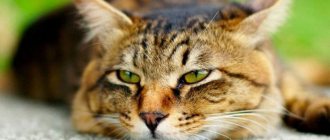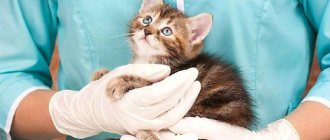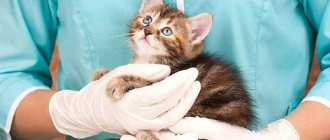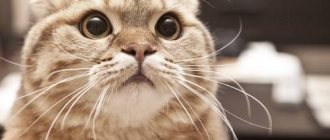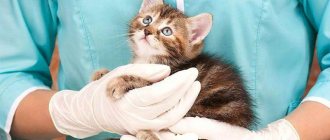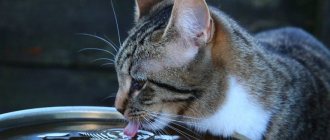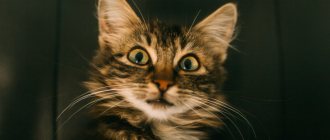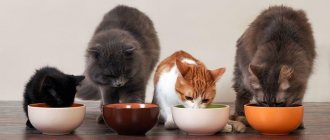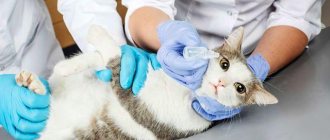How does the condition manifest?
In cats, periods of increased activity are usually followed by apathy and drowsiness. It is difficult for owners to understand why and at what exact moments this happens. Therefore, a situation where a cat is lethargic, hardly eats and sleeps a lot, is alarming.
The owner should clearly know that poor appetite and less active behavior do not always indicate an animal illness. And the veterinarian is sometimes unable to understand why the cat is lethargic. The observations of an attentive and loving owner are extremely important here.
The main signs of cat health, in addition to good appetite and good spirits, are:
- shiny and smooth coat;
- pink and slightly moistened mucous membranes;
- cold and slightly damp nose (normally, during sleep it can become warm and dry);
- pulse, respiratory rate and temperature are within normal limits;
- absence of excessive discharge from the eyes, ears and nose, plaque in the mouth, salivation and unpleasant odor from the mouth and ears.
It is important! The normal duration of rest for a cat per day is 12-14 hours or more.
Signal of a foreign body entering the digestive tract
Most owners often encounter this problem, which is especially typical for playful cats of long-haired breeds. These could be small fragments of toys, small bones, or simply large accumulations of fur from the animal itself. The main signs for identifying this factor are attacks of vomiting that occur when drinking water and food, abdominal pain and difficulty defecating. With prompt diagnosis and timely removal of the foreign material, the pet will recover completely.
Possible causes of lethargy in healthy animals
Often there are reasons why a cat is lethargic, sleeps all the time and eats little, but it is better to understand each of them in order.
Stress
It is not uncommon for a cat to eat poorly and sleep a lot after a serious nervous shock.
Cats are very sensitive animals, so they have many causes of stress:
- travel by car;
- the arrival of a new family member or pet in the house;
- change of owner;
- repair or rearrangement of the house;
- visit to the veterinarian;
- change of place of residence by owners;
- lack of attention from the owner;
- pain;
- recent surgery;
- visit of guests;
- bathing and other hygiene procedures;
- changes in daily routine;
- the appearance of new and unusual objects in the house;
- first time on the street.
Usually cats cope with this situation quite well without medical help, but they really need the support of their beloved owner. However, in some particularly susceptible cats, stress lasts for quite a long time and can even be harmful to health.
The main physiological signs of nervous shock in a cat:
- urinary incontinence;
- rapid breathing;
- diarrhea or constipation;
- increased cleanliness (a cat can lick itself until bald spots appear on its fur and irritation on the skin);
- yawning too often;
- urinating in inappropriate places (the cat is marking its territory).
It is important! If, as a result of stress, the cat’s behavior does not return to normal for a long time, it is better to show the animal to a doctor. After all, nervous shocks can negatively affect his health and lead to the development of diabetes, skin diseases and disturbances in the functioning of the cardiovascular, digestive and genitourinary systems.
Change of feed
Often the cause of a lethargic state and refusal to eat is a change in diet (for example, switching from natural food to ready-made food and vice versa).
In this situation, you should return the cat to its previous food and treat it with some treat. Then the restoration of appetite and a cheerful state will occur very quickly.
Hot weather
Cats do not have sweat glands. They do not know how to cool themselves by opening their mouths, like dogs. Therefore, in the heat, to protect themselves from overheating, furry pets try to lie more in cool places. In addition, they begin to eat less so as not to waste energy on burning calories received with food.
Age
Over time, many owners begin to worry that their once active and nimble cat has become lethargic, eating almost nothing and lying around all the time. This is easy to explain: older cats no longer have as much energy for play; they sleep longer and more soundly than young animals.
If an elderly pet is lethargic, eats without appetite and sleeps a lot, but at the same time drinks water and has the above signs of a healthy cat, then there is no need to worry. However, an older cat should be regularly taken to the veterinarian for examinations to prevent the development of diseases.
Kittens spend almost 90% of the day sleeping until they reach two months of age. If the kitten is lethargic, plays little and eats poorly during periods of wakefulness, then the best solution is a trip to the veterinarian.
It is important! The maximum duration of healthy fasting for kittens is 1 day, for young cats and middle-aged pets – 3 days, and for “old people” – 2 days. If after this time the cat still does not start eating, you need to consult a doctor as soon as possible.
Pregnancy
In the early stages of pregnancy, many cats, like people, suffer from toxicosis. They become lethargic, try to move less and more carefully, sleep more and often refuse to feed.
If a cat was mated 3-4 weeks before this condition, then after another 5-6 weeks you can expect an addition to the cat family.
Why does a cat eat little and sleep a lot for several days?
In most cases, the reason for a cat's lack of activity is due to trivial reasons.
Why does a cat eat little and sleep a lot for several days, reasons:
- The advanced age of the animal . If the cat is more than 10 years old, you shouldn’t be surprised if it turns from an active, cute kitten into a lethargic pet. Animals, like people, move less in adulthood and develop a large number of chronic ailments.
- Condition after estrus . If you have been breeding a cat, then do not be surprised if 3-4 days after this process it becomes lethargic. Over the course of 3-4 weeks, the animal will be quite lethargic and behave differently than usual. This indicates that the mating was successful, the animal needs rest, as well as good care, in order to raise strong and healthy offspring.
- Increase in ambient temperature . At a temperature of +30, not only people, but also animals do not feel very good and cheerful. The animals have decent fur, with the exception of sphinxes. Therefore, pets feel bad; often in hot weather, animals prefer to hide under the sofa, bed and in places where it is quite cool and sunlight does not penetrate. Pets hide, sleep a lot and are reluctant to come when called.
Kittens
Possible pathological conditions
If the cat has been lethargic for several days, sleeps a lot, drinks and eats poorly, and can barely walk, the owner should under no circumstances let the situation take its course. Such a condition in the pet’s body most likely signals the development of a serious disease. The cat must be shown to a doctor in the next few hours.
Anemia
Anemia occurs when a cat's body produces less red blood cells and hemoglobin.
In addition to the fact that with anemia, a cat is lethargic and sad, it also exhibits other signs of this unpleasant disease:
- the nose becomes lighter;
- mucous membranes acquire a bluish tint;
- blood pressure decreases;
- the pulse is sometimes rapid, sometimes rare;
- breathing accelerates, shortness of breath appears;
- the fur becomes dull and may fall out;
- clear discharge appears from the nose.
Diseases of the cardiovascular system
If the cat eats poorly and constantly sleeps, is lethargic, tries to walk less - these may be signs of the development of a disease of the cardiovascular system.
Your pet may be bothered by fluctuations in blood pressure.
It is important! Normally, blood pressure in cats can “jump” from 105/65 to 135/95 mmHg.
With high blood pressure, furry couch potatoes experience:
- lethargy;
- decreased vision (while moving, the cat may bump into furniture and other objects);
- rapid pulse;
- dilated pupils;
- redness of the eyes;
- sometimes vomiting;
- in some cases - nosebleeds.
With low blood pressure, the pet refuses to eat due to nausea, sleeps a lot, its pulse slows down, and the cat may even lose consciousness.
In acute heart failure, the animal is also lethargic, its breathing becomes difficult, shortness of breath and bluish discharge from the nose appear.
An important symptom of the development of heart disease in a cat is its characteristic posture in a relaxed state. She usually stands with her front legs spread wide. This makes it easier for her to breathe.
Gastrointestinal diseases
Often the cause of a pet's lethargic and sleepy state and his refusal to eat are diseases of the gastrointestinal tract.
With gastrointestinal pathologies, a cat may exhibit symptoms:
- bloating;
- stools that are very dark, almost black, or mixed with blood and mucus;
- belching;
- constipation;
- flatulence.
Diseases of the urinary system
The development of urinary system diseases in cats, in addition to a lethargic state and lack of appetite, is accompanied by symptoms:
- too frequent or infrequent urination, or its complete absence;
- constant pain when urinating;
- the appearance of blood or pus in the urine;
- sweetish smell from the mouth;
- lower back pain;
- extremely unpleasant odor of urine.
To reduce pain at least a little, the animal lies down almost all the time, does not drink or eat.
It is important! If your pet has a blockage in the urethra, without medical attention he may die within 3 days.
Infectious diseases
In many cases, a cat’s lethargic behavior, refusal to feed and staying in almost constant sleep indicate an infectious disease.
Such diseases are extremely dangerous for cats and require immediate medical attention. The owner must remember that the life of his pet is literally counted in minutes.
The most dangerous infectious diseases that cause cats to become very lethargic are:
- Leptospirosis: Caused by the bacterium Leptospira. The disease affects almost all cat organs and is very dangerous for humans;
- Calcivirosis is a viral disease that affects the respiratory tract. It occurs mainly in cats under 2 years of age, but sometimes in older individuals;
- FIV is feline viral immunodeficiency: an extremely dangerous disease that affects the immune and nervous systems. Only representatives of the cat family, including wild representatives, can become infected with it;
- Panleukopenia (popularly called feline distemper) is a deadly disease that develops very quickly. It affects the cardiovascular, digestive and respiratory systems of the cat and is accompanied by intoxication of the entire body;
- herpes virus infection (another name is rhinotracheitis): caused by the feline herpes virus. Affects the respiratory and visual organs. If the animal is weakened by other diseases and does not receive proper treatment, the infection can lead to death.
The main signs of a cat becoming infected with a dangerous infection:
- lethargy and apathy;
- lack of appetite;
- high body temperature (above 40°C);
It is important! Normal body temperature in adult cats is 38-39°C, in small kittens – 38-39.6°C, in sphinxes – 38-41.5°C.
- labored breathing;
- cough and wheezing;
- vomit;
- foul, greenish diarrhea;
- bloody discharge from the mouth, nose, ears, eyes;
- soreness in some parts of the body.
Intoxication
Poisoning of the body (intoxication) in cats, in addition to lethargy and refusal to eat, is indicated by:
- diarrhea;
- vomit;
- increased salivation;
- increase or decrease in body temperature;
- redness or blueness of mucous membranes;
- constant feeling of thirst;
- convulsions and so on.
If you suspect poisoning, you should try to induce vomiting in the cat so that the body can at least partially get rid of toxins, and then take it to the veterinarian.
However, if more than 2.5 hours have passed since the poisoning, it is better to transport the pet to a veterinary hospital as soon as possible. After all, during this time, toxic substances have already spread throughout the circulatory system throughout the body.
In order to protect your furry pets from intoxication, you need to know its main causes:
- stale or poor quality food;
- contaminated drinking water;
- bites of snakes and poisonous insects;
- helminth infection;
- bacterial and viral infections;
- violation of hygiene rules when keeping animals;
- eating poisonous plants, fertilizers, chemicals;
- uncontrolled use of medications;
- individual intolerance to certain components of feed, hygiene products, etc.;
- exposure to toxic fumes from paint and varnish products.
Parasites
The cause of lethargic behavior and drowsiness can be a cat’s infection with external and internal parasites (fleas, ticks, worms).
Flea and tick bites cause itching and pain in cats. As a result, due to constant scratching, wounds appear on the skin, and the hair begins to fall out.
A cat with ear mites often shakes its head and scratches its ears, in which a lot of wax with an unpleasant odor can be found.
Cats infected with worms are often lethargic. Other signs of the disease:
- bowel disorder (diarrhea or constipation);
- vomit;
- itching and irritation in the anal area;
- temperature increase;
- bloating;
- the presence of eggs and particles of worms in the feces.
If external or internal parasites are detected in your pet, you need to begin exterminating them as soon as possible. The veterinarian will prescribe the medications.
The fight against parasites is very important, because they are quickly transmitted to both other animals and humans.
If your cat begins to eat little due to kidney failure
There are two types of kidney failure in cats - acute and chronic, which are characterized by refusal to eat. There is severe emaciation of the animal, frequent vomiting and urination, as well as a constant feeling of thirst. A common cause of this condition may be poisoning from flowers of the lily family. The condition of acute renal failure can be treated with timely contact with an experienced veterinarian. Resuscitation facilities and prompt implementation of treatment procedures will help restore your pet’s health in the shortest possible time.
Other pathologies
In addition to the listed pathological conditions of cats, accompanied by lethargy, drowsiness and loss of appetite, the following painful conditions also occur:
- disturbances in the functioning of the endocrine system.
For example, after sterilization or childbirth due to hormonal imbalance, cats become lethargic and inactive.
Pets suffering from diabetes also do not want to move too much. In addition, such cats are constantly thirsty, eat a lot or very little, and often go to the toilet. They experience weight fluctuations, their vision deteriorates, their stomach enlarges, their muscles weaken;
- oncological diseases.
One of their symptoms in cats is a lethargic state. Changes in the pet’s well-being are clearly visible: the cat hardly eats, lies down all the time, vomits, and experiences internal bleeding. Such animals have very unpleasant breath, and upon visual examination, swelling and ulcers can be detected on the body;
- diseases of the musculoskeletal system.
Even an inexperienced owner can easily recognize them. With arthritis, dislocations, sprains, osteochondrosis, fractures and other problems, animals become lethargic, try to eat and move less. Cats' affected joints swell, they limp, rarely sharpen their claws and wash themselves. All movements cause them pain;
- complications after surgery.
Usually, in the first three days after the intervention, cats are very lethargic. This condition, in the presence of appetite and thirst, is considered normal.
But, if the animal’s temperature rises, blood or pus begins to ooze from the wound, vomiting or constipation often occurs - you need to contact the clinic as soon as possible. After all, these can be dangerous symptoms of suture dehiscence or suppuration, or the formation of a hernia.
Signs of poor appetite
If an animal sometimes refuses to eat, then there is nothing wrong with that. You may not always notice weight loss right away. Cats that live indoors need less food. Therefore, they may sometimes not feel hungry and drink only water.
Loss of appetite may be a sign of serious problems
Veterinarians identify several thinness indices. When exhausted, the animal's ribs clearly appear; if you look at it from above, its figure will resemble an hourglass. The stomach is strongly retracted.
If the cat is underweight, the ribs and spine will be clearly palpable, and there will be no fat layer. With normal weight, the animal looks like an even rectangle from above. The ribs can be felt during normal examination, but a small amount of fat will be felt.
Important! Being overweight is just as dangerous as being underweight.
The owner should only start to worry if the cat is emaciated or underweight. In this case, it is better to consult a veterinarian to determine the cause of the weight loss.
Sometimes the condition is accompanied by additional symptoms - vomiting, drowsiness, lethargy. All this may indicate the development of a serious illness. A particularly dangerous sign is refusal of water.
Emergency assistance before the veterinarian arrives
At the first signs of refusal to eat, the main thing is not to panic and try to soberly approach the issue of determining the reasons:
- Eliminate the possibility of purchasing unsuitable food
- Try replacing food
- Call emergency veterinary help
- Do not start self-medication
- Test your cat's sense of smell while giving her warm food from your hand.
- Watch the cat, especially if you are in a suburban area - maybe the cat ate a mouse or ate from the neighbors
- Avoid pet overeating
Every owner of a cat must remember that neglect of a pet can affect the occurrence of poor appetite and the development of dangerous diseases. Contacting a veterinary clinic when the first symptoms of food refusal appear will help the veterinarian quickly make a final diagnosis and prescribe the most effective treatment. The health of your pets is in your hands, and attention and care will help prevent the appearance of the above-described signs associated with loss of appetite.
What should an owner do if a cat doesn’t eat well?
First of all, you need to decide whether the owner is able to help the pet on his own. If yes, then you need to do as described above.
If a combination of the following symptoms occurs, seek veterinary help:
- the pet does not drink or eat;
- the cat is reluctant to chew food and has difficulty swallowing;
- halitosis - bad odor from the mouth;
- the cat constantly licks itself;
- diarrhea or stool retention develops;
- salivation;
- vomit;
- the coat is tousled and dull;
- skin rashes;
- conjunctivitis, rhinitis and dry nose at the same time.
Reasons for refusal to eat due to cat illness
Oral diseases. Stomatitis is an inflammation of the oral mucosa involving the mucous membranes of the cheeks, palate, gums, surface of the tongue and the mucous membrane of the lips. In cats, catarrhal, vesicular and hemorrhagic most often occur, and much less often ulcerative, diphtheretic and phlegmonous.
Stomatitis in a cat usually begins with catarrhal inflammation of the oral mucosa and is accompanied by: Increased salivation. Increased thirst. Chew carefully while eating (cat stomatitis).
Dental caries is a disease accompanied by progressive putrefactive destruction of hard tissues followed by the formation of a cavity in the affected tooth. The onset of dental caries development is usually overlooked by cat owners. The owner of a cat can detect dental caries in his cat due to difficulty in eating and chewing food, as a result of the appearance of a pain reaction, the presence of salivation, the loss of swallowed food particles from the oral cavity and an unpleasant odor (bad breath in a cat) that comes from the cat’s oral cavity, purulent or bloody discharge from the mouth.
Tartar. An unpleasant odor emanates from the cat’s mouth, we note atypical behavior in the cat when eating (arising from pain), the cat begins to refuse food, and exhaustion is observed (tartar in the cat).
Wounds and abscesses in the cat's mouth are accompanied by pain, which makes it difficult for the cat to eat, and as a result the cat refuses to eat.
Ear disease. Ear diseases in cats can be non-contagious or contagious in origin.
Otitis. Otitis in cats can be due to inflammation of the outer, middle and inner ear.
Causes of otitis. The cause of otitis in cats can be food allergies, the presence of parasites (ticks, fleas), ear injuries, foreign bodies, etc. Otitis of the middle and inner ear can be the result of complications of inflammation of the outer ear.
Signs of otitis. During a clinical examination of a sick cat, the skin of the sore ear is reddened, the cat rubs the sore ear with its paw, and tries to keep the sore ear folded and pressed to its head. If the pain in the ear is acute, “shooting,” the cat suddenly jumps up, looks around in fear, and screams. With constant pain, the cat does not allow the sore ear to be touched, avoids stroking the head, and presses the sore ear to its bedding. With purulent otitis media, inflammatory exudate is released from the cat's ear; when touched, the ear gurgles and squelches. An unpleasant odor emanates from the diseased ear. In advanced cases, in the absence of proper treatment, the cat’s body temperature rises, the cat becomes depressed, and there is no appetite. If timely treatment measures are not taken, the eardrum may be perforated, and the inflammatory process can spread to the brain (ear diseases in cats).

